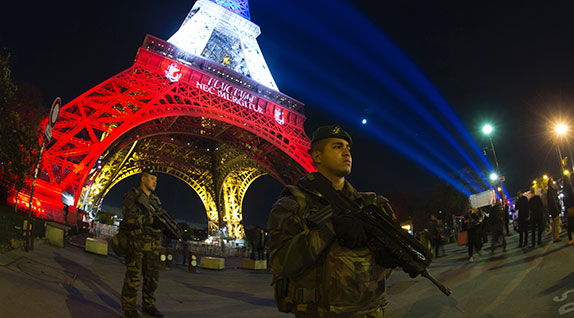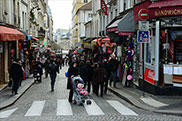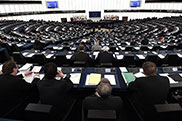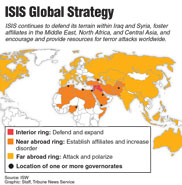 Joel Saget/AFP/Getty Images
Joel Saget/AFP/Getty Images
Article
After Islamic terrorists struck Paris again, Europe and the West are struggling with one of their worst crises since World War II.
Learn the why behind the headlines.
Subscribe to the Real Truth for FREE news and analysis.
Subscribe NowA typical soccer match between Germany and France in Paris: Players pass the ball while the crowd whistles and hollers. Even after an explosion is heard, everything continues as normal. A television announcer says it is “firecrackers being let off in and around the stadium,” as the game continues.
Little do they know it is a suicide bomber outside the stadium who killed himself and a passerby.
Two explosions later—one at a different entrance and another at a nearby fast-food restaurant—it becomes clear what is occurring. Officials lock down the stadium. French President Francois Hollande, who is among those attending the game, has to be evacuated.
A rock concert across the city: Fans sing along and hold up beer glasses as a band launches into another song.
Minutes later, gunmen linked to the Islamic State terror group (ISIS) kill 89 people.
The story is the same across the city that evening. November 13 started as a routine Friday, filled with hundreds of thousands of people dining out. Yet that ended when restaurants Le Petit Cambodge, Cafe Bonne Biere, La Casa Nostra pizzeria, and La Belle Equipe bar all experienced shootings. Le Comptoir Voltaire was also ripped apart by a suicide bomber.
The attacks, which killed 130 and left over 100 in critical condition, were labeled an “act of war” by Mr. Hollande. The Paris police chief reported that three coordinated teams were behind the killings.
Following the attacks, Brussels, Belgium, went on lockdown for six days—at a cost of $55 million per day—as authorities searched for suspected gunmen.
On November 14, award-winning British author Ian McEwan, who was in Paris during the attack, wrote this in a post for edge.org: “The death cult [terrorists] chose its city well—Paris, secular capital of the world, as hospitable, diverse and charming a metropolis as was ever devised. And the death cult chose its targets in the city with ghoulish, self-damning accuracy—everything they loathed stood plainly before them on a happy Friday evening: men and women in easy association, wine, free-thinking, laughter, tolerance, music…”
In other words, Islamic terrorists are threatening everything the Continent holds dear.
Mr. McEwan continued: “Paris, dazed and subdued, woke this morning to reflect on its new circumstances.”
“What are those changed circumstances? Security will tighten and Paris must become a little less charming. The necessary tension between security and freedom will remain a challenge. The death-cult’s bullets and bombs will come again, here or somewhere else, we can be sure. The citizens of London, New York, Berlin are paying close and nervous attention.”
Attacks on Paris mean all of Europe must reflect on its new circumstances. If such an event can occur in France’s capital, Berlin, Rome, Brussels or Athens could be next. And given the setup of the European Union, a coordinated multinational terror plot is now in the realm of possibility.
The EU is loath to give up borderless travel, multiculturalism and the rights of individual nations. Yet terror continues to push the power bloc in that direction.
Make no mistake. More attacks are coming. An operative from ISIS claims the organization has already smuggled thousands of covert terrorists into Western nations.
Can Europe protect itself against such threats? Even more, what will it be forced to do to protect its freedoms?
Growing Problem
The November 13 attacks came while other terror attacks were still fresh in Parisians’ minds. On January 7, 2015, two masked men armed with assault rifles stormed the offices of satirical newspaper Charlie Hebdo before making a successful escape, leaving 12 dead and 11 severely wounded. While the suspects were still at large, other related attacks in Paris killed five more.
In August, three Americans, including two members of the armed forces, overpowered a man that began to open fire on passengers in an Amsterdam-Paris train. The attacker injured two before being subdued.
All across Europe, the threat of Islamic extremism continues to ratchet up. Germany averted a bomb attack in April that was modeled after the 2013 United States Boston Marathon bombing.
 Frederic T. Stevens/Getty Images
Frederic T. Stevens/Getty Images Also, in September, a 41-year old radical Islamist was shot dead by police after he stabbed a policewoman in Berlin.
In February, an extremist in Denmark shot and killed two victims and injured five police.
Belgian police thwarted two attacks in 2015—and the country has quickly become notorious as a hotspot for jihadists.
The Guardian reported: “More than 250 Belgians have left the country to fight alongside jihadis in Syria and Iraq; about 75 have died in combat and 125 have returned. According to the International Centre for the Study of Radicalisation and Political Violence, Belgium has the highest rate of foreign fighters per capita of all Europe.”
Worryingly, Belgium’s capital, Brussels, is the headquarters of the EU and home to many NATO agencies.
In addition, due to Belgium’s central location in Europe, open borders, and a low level of security, the nation is prime ground for extremists to live in obscurity, collaborate with sympathizers, hatch plans, and base operations.
Terrorists across Europe are taxing the continent’s intelligence officers. A former counterterrorism investigator in France told CBS, “On the whole, during the last few years, we realized that we are not coping anymore.” He said that intelligence agencies in his nation are overloaded, and that dozens of attacks this year were only thwarted by “pure luck.”
The situation is similar throughout the EU.
Complex Problem
The main reason for the continued uptick in Islamic extremism in Europe is that there are no easy solutions. Any effort to truly solve the problem would require not a change of one policy or leader, but an entire overhaul of its system.
The European Union itself has an incredibly complex structure. There are 28 member states with 28 heads of state. There are four different presidents: the European Parliament president, the European Commission president, and the European Council president, who is not to be confused with the rotating presidency of the European Council, which is shared between member states for six-month terms. Any sweeping change to the power bloc must be agreed upon by differing nations with very unique cultures and ideas.
As a result, every attempt to stem the growing tide of terrorism is a mess of complications.
If the EU decided to close all national borders, for example, it would effectively reverse the free-travel Schengen Agreement.
Migration expert Matthieu Tardis explained to AFP why this is a problem: “Calling Schengen into question is a risk because each state deals with the issue in a very national way based on public opinion—and in the end what is called into question is the crossing of national borders.”
Open borders cannot go away without other problems. The agreement has been a boon to Europe’s single market by reducing costs of goods, and has increased a sense of unity among Europeans. Reinstituting borders and customs would reverse these effects.
It could also force thousands of nationals to relocate. For instance, a Spanish native living in Belgium would potentially have to change his citizenship, get a visa, or move back to his country of origin. This does not even get into the logistical nightmare of figuring out what citizens are currently where.
Another issue is how to handle those fleeing to the EU from wars and environmental disasters. If the power bloc stops accepting the downtrodden from war-torn areas of the Middle East, it will be seen as harsh. Yet among the many legitimate evacuees, there could be terrorists in refugee clothing as was the case with one perpetrator in the latest bombing in Paris.
While Europe celebrates being a melting pot of cultures, this love of multiculturalism is being tested by a continuing increase in the number of Muslims there. In Germany and France, they make up 5.8 percent and 7.5 percent of the population, respectively.
 Frederick Florin/AFP/Getty Images
Frederick Florin/AFP/Getty ImagesIf governments crack down on adherents to Islam, many innocent Muslims may be affected or be inadvertently radicalized.
Other Muslims have chosen radical Islam because of impoverished conditions in EU nations such as France.
“Islam is a permanent part of France now. It is not going away,” Soeren Kern, an analyst at the Gatestone Institute and author of Islamization of France told The Washington Times. “I think the future looks very bleak. The problem is a lot of these younger-generation Muslims are not integrating into French society. Although they are French citizens, they don’t really have a future in French society. They feel very alienated from France. This is why radical Islam is so attractive because it gives them a sense of meaning in their life.”
No matter the decision, European leaders are stuck between a rock and a hard place.
Greatest Threat
Upholding EU ideals in the midst of this turmoil has proven to be an impossible juggling act. The power bloc cannot do either very well. The true threat may be against the EU as we know it. This is a predicament that is dividing the continent.
“Even before Paris, Schengen was crumbling under the pressure of what some have called the great migration from the Middle East and Africa into the EU…many [after the Paris attacks] will no doubt conclude that not only do the foreigners arriving on this continent threaten their culture and livelihood, some of them pose a physical threat too.
“To state the obvious…European feelings about immigration were already red-hot. The great migration has set neighbouring states against each other—the east-west split in the EU over accepting migrants is arguably the biggest threat to the union’s future—and shaken up settled political systems: even Angela Merkel, who has for so long looked like a-near permanent feature of German politics, now looks mortal” (The Telegraph).
Ms. Merkel’s decade-long and powerful position as German chancellor is under severe threat as a backlash to her continued approval of more Syrian refugees into her nation.
The Telegraph article summarized where this appears to be heading: “So no one should be surprised if passport checks and checkpoints start reappearing and borders that previously existed only on paper start again to take physical form.”
But what of the European ideal?
Open borders and individual nations functioning as one is at the core of what EU founders had in mind so many decades ago. These values cannot simply go away and the union remain intact.
“Pressure is growing on countries to act,” Josef Janning, head of the Berlin, Germany, office of the European Council on Foreign Relations, told The Wall Street Journal, “but the ability to do so in a European framework is not.”
In the past, those calling for closed borders as a way to maintain national sovereignty and control may have been a faint whisper against the overwhelming voice of those pointing to the benefits of unity. But in the wake of recent attacks there has been a shift.
Notice the challenge leaders now face: “Politically, [leaders] must convince the public that openness works despite the cross-border movements of the Paris attackers. Practically, they must find ways to improve joint European security mechanisms that have proved to be of limited efficacy” (ibid.).
In other words, those seeking to have borders remain open are simply asking for the enforcement of laws that clearly do not work.

Yet there are advocates for measures beyond closed borders. Others are calling for Europe to turn away refugees and anti-Islamic sentiments are brewing across the continent.
The difference in responses between France’s January Charlie Hebdo attack and the November Paris attacks brings this to life.
“Unlike the response in January after attacks at the satirical newspaper Charlie Hebdo and elsewhere left 17 dead, there were no grand public appeals for solidarity with Muslims after the Friday attacks that left 129 dead in Paris. There were no marches, few pleas not to confuse practitioners of Islam with those who preach jihad,” The New York Times reported.
“Instead, there was a palpable fear, even anger, as President Francois Hollande asked Parliament to extend a state of emergency and called for changing the Constitution to deal with terrorism. It was largely unspoken but nevertheless clear: Secular France always had a complicated relationship with its Muslim community, but now it was tipping toward outright distrust, even hostility.”
EU leadership, including European Council President Donald Tusk, also appears ready to act.
“Speaking in Strasbourg, President Tusk said the crisis threatened to transform the EU and destroy principles such as border-free travel between Schengen zone countries. ‘This challenge has the potential to…cause tectonic changes in the European political landscape,’ he said.”
“Mr Tusk said these were ‘extraordinary times’ that required ‘extraordinary measures, extraordinary sacrifices and extraordinary solidarity’” (BBC News).
These “extraordinary times” dictate that more of the same will not get the job done. Europe is being forced to truly approach the problem in a special or remarkable way. Otherwise, they can expect the same—if not worse—results.
Forcing Europe’s Hand
The only two solutions are individual nations breaking off from the union to protect themselves or, more likely, nations giving up more power to a centralized European Union. The latter solution allows citizens on the continent to better maintain their current standard of living.
Terror experts make clear what it will take for the EU to combat radical Islam, as demonstrated by a few examples from think-tank Carnegie Europe. The top solutions are increased intelligence gathering, better intelligence communication between nations, and more military intervention in countries with large terrorist presences such as Syria, Yemen and Iraq.
- Francois Heisbourg, special adviser at the Foundation for Strategic Research: “At the EU level, the union should energetically implement the measures that interior ministers defined in December 2014. In particular, the European Parliament should approve an EU no-fly list and passenger name recording to hinder ‘jihad tourism.’ The EU’s border agency Frontex should revise its role and resources, for the same reason. All countries within the EU’s passport-free Schengen area—indeed, all EU members—should join the Prum Convention, which aims to step up cross-border cooperation, particularly in combating terrorism.”
- Rem Korteweg, senior research fellow at the Centre for European Reform: “The [Paris] attacks show that foreign policy and internal security are intimately connected. The West has been hesitant in responding to recent crises in Yemen, Syria, and Iraq, and parts of these countries (and others in North Africa) are now incubators for jihadist terrorism. The West can ill afford to ignore such safe havens.
“Several thousand Europeans are fighting in the ranks of the Islamic State. Some will return home. Europe’s leaders must agree on a common strategy to make life difficult for returning jihadists, including by creating barriers to travel, sharing intelligence better, and stemming the flow of small arms on Europe’s black markets.”
- Stephen Szabo, executive director of the Transatlantic Academy: “The EU and its member states can protect themselves against terrorism, but only if they coordinate closely with each other and with the United States, and if they take actions to fix the longer-term social problems that are the root causes of violence.
“The horrible events in Paris on January 7-9 have put the U.S.-European rift over the NSA spying scandal into a broader perspective. Intelligence sharing is now at the top of the agenda. Certainly, Europe must maintain civil liberties and the right balance between individual freedoms and national security, but without security, there will be little meaning to civil liberties.”
Note the common themes: the EU needs more robust intelligence forces, a united army to address both foreign and domestic concerns—and the willingness to use it—as well as an overall closer union to make this all work. In other words, they will have to give up some freedoms to ensure national security.
A continued series of terror crises will trigger action by individual nations and the EU as a whole. This is already beginning. The governments of France and Britain are already bombing ISIS targets in Syria. Germany has agreed to send military assistance for the campaign.
Terrorism is compelling the continent to work together like never before. Other economic and social problems will also push nations to give more and more power over to a central authority.
Soon, this will be seen as the only way Europe can protect itself.
More on Related Topics:
- Spain Is Granting Legal Status to Potentially 500,000 Immigrants
- Bulgaria’s Government Resigns After Mass Protests
- 10 Years After the Bataclan Massacre, Paris Is Still Scarred by That Night of Terror
- French Government Collapses in 14 Hours, Deepening Political Crisis
- French Parliament Ousts Prime Minister, Deepening Political Crisis


